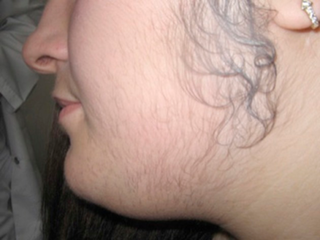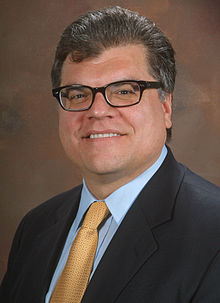
Polycystic ovary syndrome, or polycystic ovarian syndrome (PCOS), is the most common endocrine disorder in women of reproductive age. The syndrome is named after cysts which form on the ovaries of some women with this condition, though this is not a universal symptom, and not the underlying cause of the disorder.

Hirsutism is excessive body hair on parts of the body where hair is normally absent or minimal. The word is from early 17th century: from Latin hirsutus meaning "hairy". It usually refers to a male pattern of hair growth in a female that may be a sign of a more serious medical condition, especially if it develops well after puberty. Cultural stigma against hirsutism can cause much psychological distress and social difficulty. Discrimination based on facial hirsutism often leads to the avoidance of social situations and to symptoms of anxiety and depression.
Anovulation is when the ovaries do not release an oocyte during a menstrual cycle. Therefore, ovulation does not take place. However, a woman who does not ovulate at each menstrual cycle is not necessarily going through menopause. Chronic anovulation is a common cause of infertility.

Hyperandrogenism is a medical condition characterized by high levels of androgens. It is more common in women than men. Symptoms of hyperandrogenism may include acne, seborrhea, hair loss on the scalp, increased body or facial hair, and infrequent or absent menstruation. Complications may include high blood cholesterol and diabetes. It occurs in approximately 5% of women of reproductive age.

Augusta State University was a public university in Augusta, Georgia. It merged with Georgia Health Sciences University in 2012 to form Georgia Regents University, later known as Augusta University.

Augusta University (AU) is a public research university and academic medical center in Augusta, Georgia. It is a part of the University System of Georgia and has satellite medical campuses in Savannah, Albany, Rome, and Athens. It employs over 15,000 people, has more than 56,000 alumni, and is accredited by the Southern Association of Colleges and Schools.
Frank A. Chervenak, MD currently serves as Chair of Obstetrics and Gynecology, Lenox Hill Hospital; Chair of Obstetrics and Gynecology and Associate Dean of International Medicine, Zucker School of Medicine at Hofstra/Northwell.

Reproductive medicine is a branch of medicine concerning the male and female reproductive systems. It encompasses a variety of reproductive conditions, their prevention and assessment, as well as their subsequent treatment and prognosis.

1D-chiro-Inositol or D-chiro-inositol is a chemical substance with formula C6H12O6, one of the nine isomers of cyclohexane-1,2,3,4,5,6-hexol. The molecule has a ring of six carbon atoms, each bound to one hydrogen atom and one hydroxyl (OH) group. The hydroxyls on atoms 1, 2, and 4, in counterclockwise order, lie above the plane of the ring. The molecule being distinct from its mirror image, the compound is chiral, hence its name. Its enantiomer is 1L-chiro-inositol.
Hyperthecosis, or ovarian hyperthecosis, is hyperplasia of the theca interna of the ovary. Hyperthecosis occurs when an area of luteinization occurs along with stromal hyperplasia. The luteinized cells produce androgens, which may lead to hirsutism and virilization in affected women.
Ovarian drilling, also known as multiperforation or laparoscopic ovarian diathermy, is a surgical technique of puncturing the membranes surrounding the ovary with a laser beam or a surgical needle using minimally invasive laparoscopic procedures. It differs from ovarian wedge resection, which involves the cutting of tissue. Minimally invasive ovarian drilling procedures have replaced wedge resections. Ovarian drilling is favored over wedge resection because cutting into the ovary might result in adhesions, potentially complicating postoperative outcomes. Ovarian drilling and ovarian wedge resection are treatment options to reduce the amount of androgen producing tissue in women with polycystic ovarian syndrome (PCOS). PCOS is the primary cause of anovulation, which results in female infertility. The induction of mono-ovulatory cycles can restore fertility.
Augusta University Health is an academic health center that manages the clinical operations associated with Augusta University. It is a health care network that offers primary, specialty and sub-specialty care in the Augusta, Georgia area and throughout the Southeastern United States.

The Medical College of Georgia is the medical school of Augusta University, the state's only public medical school, and one of the top 10 largest medical schools in the United States. Established in 1828 as the Medical Academy of Georgia, MCG is the oldest, and a founding, school of Augusta University, and played a role in the establishment of the American Medical Association and the standardization of medical practices. It is the third-oldest medical school in the Southeast and the 13th oldest in the nation. With 22 departments, it offers both a Doctor of Medicine (MD) as well as MD-PhD, MD-MPH, and MD-MBA degrees. Its national ranking in research is Tier 3, and its ranking in primary care is Tier 2, both out of four tiers of 196 ranked medical schools.
Augusta University was officially formed January 8, 2013, from the consolidation of Augusta State University and Georgia Health Sciences University in Augusta, Georgia by order of the University System of Georgia Board of Regents.
An estrogen-dependent condition can be that relating to the differentiation in the steroid sex hormone that is associated with the female reproductive system and sex characteristics. These conditions can fall under the umbrella of hypoestrogenism, hyperestrogenim, or any sensitivity to the presence of estrogen in the body.

Breast atrophy is the normal or spontaneous atrophy or shrinkage of the breasts.

The HAIR-AN syndrome is a rare subtype of polycystic ovary syndrome (PCOS) characterized by hyperandrogenism (HA), insulin resistance (IR) and acanthosis nigricans (AN). The symptoms of the HAIR-AN syndrome are largely due to severe insulin resistance, which can be secondary to blocking antibodies against the insulin receptor or genetically absent/reduced insulin receptor number/function. Insulin resistance leads to hyperinsulinemia which, in turn, leads to an excess production of androgen hormones by the ovaries. High levels of androgen hormones (hyperandrogenism) in females causes excessive hair growth, acne and irregular menstruation. Patients with both underlying mechanisms of insulin resistance may have more severe hyperandrogenism. Insulin resistance is also associated with diabetes, heart disease and excessive darkening of the skin
Ayman Al-Hendy, is a professor and director of translational research from Department of Obstetrics and Gynecology, University of Chicago. His branch of medical/surgical knowledge is obstetrics and gynecology, particularly in the spheres of “gene/stem cell therapy”, “reproductive genetics”, and “stem cell biology”.
Duru Shah is a Mumbai-based gynaecologist academic and women activist. She is the Founder President of the PCOS Society, India and a promoter of adolescent girls and women's health and infertility in India. Shah is also the promoter of Metropolis Healthcare Ltd. She is also a Consultant ObGyn.: Breach Candy Hospital, Jaslok Hospital, Mumbai.
Angelica Lindén Hirschberg is a Swedish obstetrician, gynecologist and academic. She is a professor in Obstetrics and Gynecology at Karolinska Institutet, Senior Consultant in the Department of Gynecology and Reproductive Medicine and the Head of Women's Health Research Unit at the Karolinska University Hospital.










